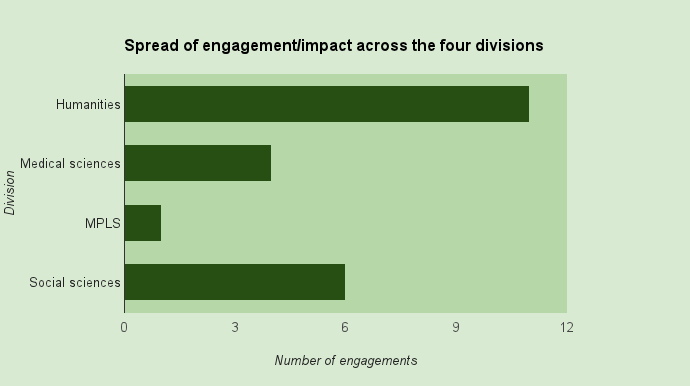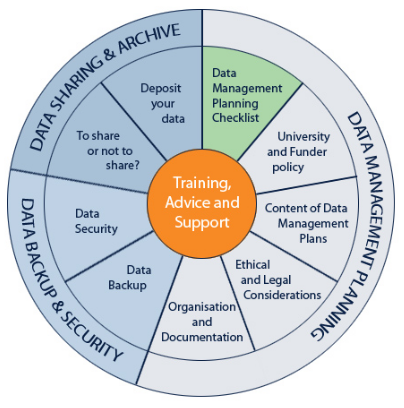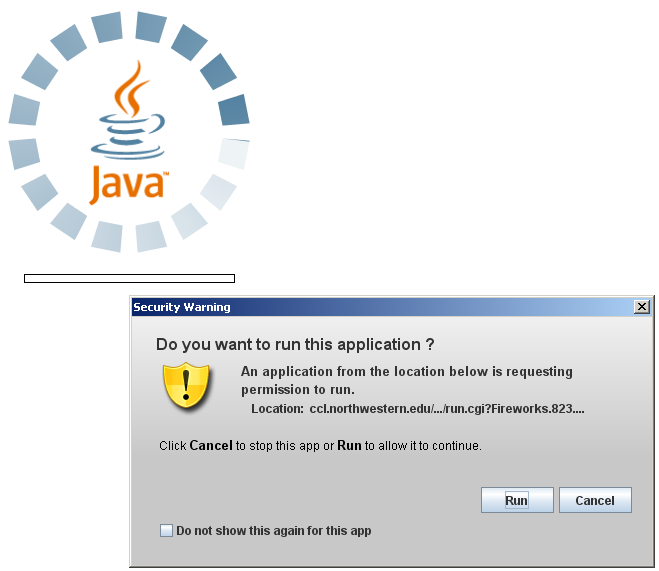
Simple engagement statistic: the affiliations of the people we have worked with this month e.g. through requests for advice and teaching support.
The research support team:
- Offers free advice (30-120 minute meetings) to academics on a wide range of topics e.g. research data management (RDM), the Text Encoding Initiative (TEI), agent-based modelling (ABM), building an academic online presence
- Supports academics in designing and writing funded project proposals
- Manages projects (PI, co-PI and PM roles) and leads IT-related work packages/tasks
- Organises and contributes to a wide range of events e.g. Digital Humanities Summer School and the ABM get-together
- Offers taught courses, and support teaching in departments e.g. TEI, academic online presence, ABM, RDM
- Develops and maintains cutting-edge educational and research technologies e.g. the BehaviourComposer
Advice
Meriel ran two half-day Introduction to Research Data Management training events for Oxford researchers from the MPLS and Medical Sciences Divisions. These were the first instalments in a series (aimed at chiefly graduate students and researchers near the beginning of their career) which is being offered via all four academic divisions – there will be similar courses for Humanities and Social Sciences in Trinity term. The series grew out of a half-day course initially offered to the Medical Sciences Division: other divisions then asked for similar course. Meriel was also invited to contribute a lunchtime session on research data management, as part of the Humanities Division’s Ten Top Things Researchers Need to Know series. If you would like an RDM session for your group, send an email to: damaro@oucs.ox.ac.uk
Summary of advice:
- James C helped colleagues in the Bodleian think through their use of the Fihrist TEI ODD to analyse Hebrew and Sanskrit texts.
- Howard worked with Dr. Recker in the Zoology department to plan 2 x 3 hour computer-practical teaching exercises for sixty 2nd-year undergraduates
- Martin helped MSt English Language students make decisions about dissertation options.
- James C supported academics in both Theology and Modern Languages in writing funding proposals
- James C and Jill met colleagues in Public Health to discuss a global health distance learning course.
- Howard met a Masters student who wanted advice on how to get started in creating an ABM of electricity supply and demand in rural India.
- James C proof-read and commented on AHRC and John Fell proposals for the Humanities department
Teaching
Martin taught two courses on research methods for working with electronic text collections. In Michaelmas Term, the course ‘Using Corpora to Investigate English Usage’ was taught to the students on the new M.St. English Language course in the English Faculty. In-depth consultations were also given to individual students to assist them with data gathering and analysis for their assignments. In Hilary term, the 6-week course in ‘Corpus Linguistics’ was offered for the fourth consecutive year as an ITLP course, with attendance from Masters students from the Faculty of Linguistics, Phonetics and Philology (FLPP), where it was listed as an optional course. There were also participants from OUP, English, the Language Centre, Education, Anthropology, and other faculties. Both courses were taught in collaboration with Ylva. Martin also assists with induction presentations on research methods to humanities students in the Faculty of English and FLPP, together with faculty and library staff.
Summary of teaching:
- James C taught a full day course on TEI for the the British Library (focusing on manuscript description)
- Meriel taught a half-day Introduction to research data management course for a group of DPhil students and PostDocs in the MPLS division.
- Meriel taught a half-day Introduction to research data management course for the Medical Sciences division.
- Meriel gave a lunchtime talk Ten top things researchers need to know about research data management for Humanities and Social Sciences divisions
- Howard supported Dr. Recker in teaching the infectious disease control ABM practical (2 x 3-hour practicals for 60 2nd-year undergraduates in the Zoology department)
- Howard (with Steve and Kate) taught the introduction to online presence ITLP course twice (open course and closed course for the social sciences department)
- Howard (with Steve and Kate) taught the advanced online presence ITLP course
- James C taught a Digital Manuscripts class for MSt students at Oriel College with Dr Eyal Poleg
- Ken taught an Introduction to ABM course for 40 students at the Udayana University in Bali!
Projects
JISC DaMaRo project
(James Wilson, Meriel Patrick and Asif Akram, with colleagues in the Library department). The JISC-funded Damaro Project is currently working on the user interface for the DataFinder tool. In particular, we’ve been getting the manual contribution form working, which will enable people to describe any data they’ve produced so that it can be found again (and understood) in the future. DataFinder will in due course be the catalogue of research data produced at Oxford. We’d like to start testing this shortly, so if you’re interested in finding out more about the system and ensuring it’s usable in practice, please get in touch with us at damaro@oucs.ox.ac.uk. We’ve also been working on the service plans for DataFinder and DataBank (the University’s forthcoming research data archive), considering what we can offer from the end of the project in June, and how much that will cost. To find out more about Damaro, visit the website at: http://damaro.oucs.ox.ac.uk/
ORDS Uptake project
(James Wilson, Meriel Patrick and Asif Akram, with colleagues in the Library department). The UMF-funded ORDS Uptake Project is working on developing the University’s planned ‘Online Research Database Service’ so that it can serve the needs both of researchers at Oxford, and those at other universities around the UK. This month the project had its first Steering Group meeting, at which we discussed commercialization options with Isis Innovation and with Tim Parkinson from the University of Southampton, who has been undertaking a similar process with the Smart Research Framework that they have been developing. Besides that we’ve mostly been working to understand the needs of our early adopters and trying to arrange partnerships with other Universities. If you are a researcher based at Oxford and your research involves working with databases (or spreadsheets that would be better off as databases), we’d be delighted to work with you. Anyone willing to act as an early adopter and help us find bugs and provide feedback about the service at present will be able to use it for free for the next few years. Email ords@it.ox.ac.uk if you’d like to discuss this further. To find out more about the Online Research Database Services, visit the website at: http://ords.ox.ac.uk/
JISC Software Hub project
(Mark Johnson, Scott Wilson, Howard Noble, Sebastian Rahtz and colleagues at the SSI Unit in the University of Edinburgh). The Software Hub project started in November and will run for a year. The aim is to make a catalogue of software products that were funded, or part funded by the JISC, and to promote the most sustainable or mature products as solutions. Perhaps the most innovative aspect of this project is the work to make it easier for people to gain access to demo versions of web applications e.g. by making VMs available via hosting services such as the Microsoft Azure.
OUP John Fell making models not asking questions project
(Prof. David Zeitlyn (Anthropology), Ken Kahn and Howard Noble) This project started in January and will run for 10 months. We will pilot the use of agent-based computer models that have game-like elements built into them, to help communicate and discuss the risk that increased climate variability poses to rural farmers in Cameroon. Read more on the modelling4all Cameroon project blog thread.
System development
Ken released a major update to the modelling4all software. It seems as though Java Applets are becoming ever more problematic with increasing numbers of security warnings. Modelling4All relies on Applets to display the NetLogo program compiled within a browser. This new release makes it possible to bypass applets by providing a convenient way to compile a model created within the behaviour composer inside of NetLogo itself. This has the additional benefit of improved debugging and likely faster simulation run times. It may also help in situations where Internet access is patchy or non-existent e.g. the modelling4all’s latest project in Cameroon.Read more about this new release and other developments to the modelling4all software.
Summary of development activity
- James C and Sebastian R have been working on an XML conversion of a Polish Dictionary for the Oxford University Press.
- James C reported and fixed a bug on the University’s Open Data Site: Data.Ox
- Howard is building a NetLogo model for the John Fell project (see above)
- James C drafted a workplan for a French Storytellers corpus for an academic at Queen’s University Belfast
- James C started some work on the Online Egyptological Bibliography database
Funding news and secondments
James C et al have put in an EC funding bid: Digital Scholarly Editions Initial Training Network (DiXiT) in the Marie Curie Initial Training Network, to focus on infrastructure for digital scholarly editions, has reached negotiation stage. Project PI: Prof Andreas Speer, University of Cologne, Oxford PI: Dr James Cummings
Martin is working on secondment with The Oxford Research Centre for the Humanities (TORCH), a major new interdisciplinary centre based in the recently renovated Radcliffe Humanities building on the Radcliffe Observatory Quarter site. His duties involve project management of the development and launch of a new website for TORCH, together with the InfoDev team, integrating the Digital Humanities at Oxford website, and developing a strategy for the sustainability of TORCH’s web presence.
Publications
- Patrick, Meriel. “Research data management training: face-to-face courses.” DaMaRO Project blog. IT Services, University of Oxford. 6 March 2013. Web. 20 March 2013.<http://blogs.it.ox.ac.uk/damaro/2013/03/06/research-data-management-training-face-to-face-courses/>
- Patrick, Meriel. “DaMaRO presenting at DigCurV conference.” DaMaRO Project blog. IT Services, University of Oxford. 18 March 2013. Web. 20 March 2013.<http://blogs.it.ox.ac.uk/damaro/2013/03/18/damaro-presenting-at-digcurv-conference/>
- Noble, Howard. “Putting weather predictions into the model.” Modelling4all Project Blog. University of Oxford, IT Services department. Web. Date of access. 12th March 2013. http://blogs.it.ox.ac.uk/modelling4all/2013/03/12/putting-weather-predictions-into-the-model/
- Cummings, James. “Self Study (part 4) TEI Core Elements” In my <element/> blog. IT Services, University of Oxford. 23 February 2013. Web. 20 March 2013 <http://blogs.it.ox.ac.uk/jamesc/category/selfstudy/>


